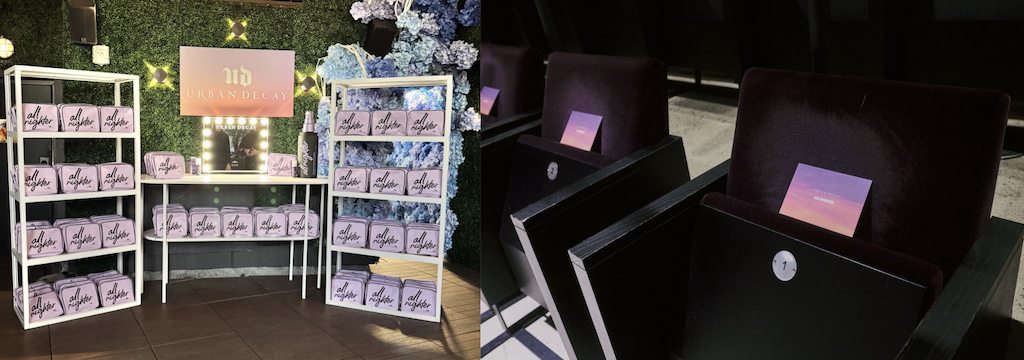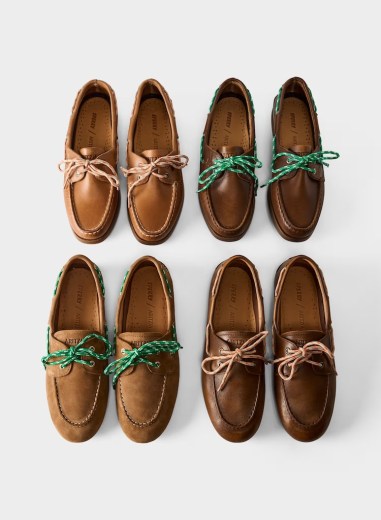To receive the Glossy Pop newsletter in your inbox every Friday, click here.
All products featured on Glossy Pop are independently selected by our editorial team. However, when you buy something through our retail links, we may earn an affiliate commission.
K-Beauty, as Americans have referred to it for a decade or so, has mostly referred to skin care.
That skin care has now made its way onto the top shelves of beauty aficionados around the country and has led to many Korean brands earning coveted shelf space at Sephora, Ulta Beauty and Target in the last few months. As South Korea’s exports become widely embraced, it’s unsurprising that curiosity has started to reach beyond its complexion products.
The stage is set for Korean makeup to become a major second act. The country’s color cosmetics are known for their light, natural finishes and competitively priced products. No-makeup makeup is the prevailing style, and cosmetics often features the same unique textures that K-Beauty skin care has become famous for. Some brands, like Fwee, are already starting to break through, thanks to products like its visually appealing, social-media-ready, viral Blurry Pudding Pots.
But to truly penetrate the American marketplace, Korean makeup has to overcome one big challenge. For years, Korean-based brands could launch complexion products in a mere three to five shades, which would be enough to suit the limited range of skin tones that make up its population, according to interviewees for this story. But to compete in America, where 50+ shades of foundation have been the benchmark since Fenty Beauty launched in 2017, Korean brands will have to be able to do the same. Some are already catching up.
Take TirTir, which spans both skin care and color cosmetics. It is best known for its $25 Mask Fit Red Cushion Foundation. When its cushion compact, a very popular Korean format of foundation, first started to gain traction on TikTok, it had just three shades available. Today, it has 45, 40 of which are available stateside.
When content creator Darcei Amanda (@missdarcei, 2.1 million TikTok followers) posted last March asking the brand to make her shade, it answered her call. At the time, it offered nine shades. A March 2024 post in which Mikayla Nogueira gave the cushion compact a rave review further amplified the brand’s awareness in the states. As TirTir endeavored to expand its shade range, it enlisted Amanda and other BIPOC creators including Golloria George (3.2 million TikTok followers) to provide feedback, in addition to gathering feedback from consumers via its Instagram, gathering insights from 2,122 respondents. Later, in June 2024, TirTir conducted another consumer survey, as it expanded from 30 to 40 shades, receiving 7,010 responses. This time, it sought to address concerns about not having pale enough shades for some U.S. consumers. For that, it tapped creators such as Oceanne Comtois (461,000 TikTok followers); it also further expanded its range for deeper skin tones, working with creator Crystal Nicole (545,000 TikTok followers).
“[We have to] know how important diversity is in the U.S., not only for the skin tone, but culturally. We have to understand that it’s a diverse country, and we need to cater to every race in the U.S. and the world,” said Kaia Park, TirTir’s global PR manager. TirTir’s commitment to achieving inclusivity, and doing so quickly, has paid dividends for TirTir, which said it increased revenue in 2024 from 170 billion KRW to 270 billion KRW — or, from approximately $117 million to $185 million — following its global expansion.
Hera, a luxury color cosmetics brand owned by Amorepacific, was the first brand to introduce cushion compacts back in 2008. Its Black Cushion Foundation is Korea’s bestselling cushion compact, according to 2024 Beauté Research reporting.
“One of the many important factors for base makeup is how the product impacts the skin. All of Hera’s base makeup items are infused with skin care or SPF and often include technological innovation to nourish the skin,” said Suji Hong, marketing communications manager at Hera. “For example, the Black Cushion Foundation provides 24-hour hydration and improves the oil-moisture balance of the skin, even though it has a semi-matte finish and high coverage.”
Makeup with skin-care benefits is a common theme in Korean makeup — and one that brands like Rhode, with its peptide-infused lip treatments, have helped to popularize in the U.S., as well.
Hong said creating products in a diverse array of shades is not the hard part — the difficulty lies in maintaining the consistency of quality and skin-care benefits across a wider shade range.
“[We want to] perfect the formula so that all customers have the exact same experience, regardless of the shade they’re using,” she said. “When the type, or level of pigment, changes, the ingredients of the formula have to be altered accordingly, which is why we have been spending a lot of time researching and testing our complexion products.” Hera’s cushion compact is currently available in nine shades in the U.S., all of which are on the lighter side, but Hong said the company is making headway and will launch an expanded shade range soon.
K-Beauty skin-care brand Beauty of Joseon already has a stronghold in the states, in part due to TikTok’s obsession with its sunscreen. The brand will debut at Sephora later this year. In January, Beauty of Joseon debuted a collection of 12 shades of tinted mineral sunscreen ($20). Having never formulated tinted products before, the brand asked its lab to conduct research and tap specialists in hybrid skin care-makeup products, said Sumin Lee, its co-founder. Outside of the largest Korean labs, most are not well-versed in creating a diverse range of shades, she said. The brand worked to find local testers for some of its darker shades, even calling local universities asking for foreign students who may be interested in helping to test the product. The reception of the tinted mineral sunscreen has been positive, thus far, Lee said, and there are plans to expand the shade range further to better account for more undertones.
When asked if she thought Korean color cosmetics could take off in a big way stateside, Lee said their strength is in their potential to create hybrid products that combine the country’s skin-care savvy and makeup. “Unlike with skin care, [consumers] recognize that U.S. products are good enough,” she said. To that end, the brand plans to continue to expand in the color cosmetics realm through hybrid products, such as tinted lip balms.
But outside of complexion products, there is also opportunity for Korean makeup growth.
“The Korean style of makeup tends to be more natural and softer, emphasizing a no-makeup makeup look that gives a transparent, fresh image. Koreans favor products that help achieve a clear, glowing skin texture,” said Jena Chung, a marketing executive on the global e-commerce team at Etude, another color cosmetics brand owned by Amorepacific. “Glowing skin has always been popular in Korean makeup, where the focus is on maintaining a moist, clean and radiant complexion. And recently, this glowing skin trend, often referred to as ‘glass skin,’ has also gained traction in America.”
A recent Etude launch, its $20 Nymph Aura Volumer Primer, offers a perfect example of the K-Beauty makeup aesthetic. A recent TikTok posted by creator Elnaz Golrokh (1.3 million TikTok followers) demonstrates the instant glass-skin look achieved with the product. The post, which was part of a paid partnership, has garnered over half a million likes.
“As a K-beauty brand, our product line has traditionally focused on Asian beauty standards and color spectrums. However, as we expand into the U.S. market, we plan to conduct further research and broaden our product lines to better suit American consumers,” Chung said. “We plan to expand our color range, especially focusing on lip makeup, which is one of our strengths.”
Etude is currently developing complexion products that will address the diverse range of skin tones in the United States. Its makeup products are primarily sold on Amazon in the states.
Korean makeup brand Fwee does not sell any complexion products, but its bestselling Blurry Pudding Pot — a blush-lip combo product — has achieved virality on TikTok, thanks in part to its expansive 30-shade range and visually and sensorially appealing texture.
“Two or three years ago, K-beauty [products were only offered in a] limited color spectrum that matched only fair skin tones, but that is no longer the case,” said Geena Kim, Fwee’s team manager.
Commenting on the Pudding Pot’s success, she said, “Its satisfying texture and product design caught the attention of U.S. consumers, with many mega-influencers voluntarily uploading reviews on TikTok.”
Fwee first launched in 2021, but it started to see greater success and growth last year after a full rebrand, Kim said. The brand has attracted so much attention stateside that it now plans to open a physical store in New York City, to help “unlock unique opportunities for growth … With the opening of offline stores, we plan to have more influencers experience our products through PR and offline events.”
Urban Decay takes (Off) Broadway

Sunday night marked the opening of “All Nighter,” a new Off Broadway play starring a litany of cool girls: “The Sex Lives of College Girls” star Alyah Chanelle Scott, “Bottoms” co-star Havana Rose Liu, “The Buccaneers” actor Kristine Frøseth, Broadway’s “Jagged Little Pill” star Kathryn Gallagher, and Julia Lester, who starred in the most recent Broadway revival of “Into The Woods.”
The show provided an interesting partnership opportunity for Urban Decay, as one of the brand’s most iconic products is its setting spray, which shares its name with the play. Guests at opening night found branded postcards on their seats and attendees of the afterparty, held at Midtown’s Dream Hotel, were gifted the product in a branded cosmetics case.
“Theater and beauty share a deep connection — both are about transformation, self-expression and storytelling,” said Ally Blueweiss, partnerships lead at Runyonland Productions, the company behind “All Nighter.”
Though beauty partnerships are a dime a dozen in fashion, music and sports, Broadway remains somewhat of a white space.
Blueweiss believes that should change. “Theater offers a unique opportunity to reach highly engaged audiences in a setting built on creativity and spectacle. With Broadway attracting press, influencers and celebrities, it’s a natural stage for beauty brands to create memorable, immersive moments that go beyond traditional partnerships,” she said.
Regarding the partnership, Fernando Febres, head of U.S. marketing at Urban Decay said, “The most amazing, yet very obvious, answer [to why we engaged in this partnership] is the name of the play. … But furthermore, the cast, storyline and audience target demographic are also in line with Urban Decay’s focus.”
Already, he said, the partnership has garnered positive buzz on social media.
Collab of the week: Sperry x Aritzia

Boat shoes are decidedly back, but for those seeking a twist on the classics, look no further than Aritzia’s new collab with Sperry, inclusive of two styles, the Authentic Original Boat Shoe ($120) and the Slim Boat Shoe ($120).
“Aritzia is the perfect partner to introduce [Sperry] to a new generation,” said Jonathan Frankel, president of Sperry. “They’ve built a deeply engaged community that’s effortlessly cool and always ahead of the trends. We’re excited to collaborate with them for seasons to come. This collection highlights our iconic Authentic Original Boat Shoe and the new Slim Boat Shoe, both featuring interchangeable laces for a personalized touch.” Those interchangeable laces include not just fun, colorful options, but also curlicues that infuse new playfulness into an old classic.
Inside our coverage
Mikayla Nogueira wants to build a legacy beauty brand with her new venture, Point of View
Living Proof’s new campaign stirs controversy over silicones
Hally Hair’s Kathryn Winokur: ‘Gen Z is not static — she’s growing up’
Reading list
This brand wants to make you sporty, rich—and now, sexy
Is the age of health care TMI actually making us feel like crap?




